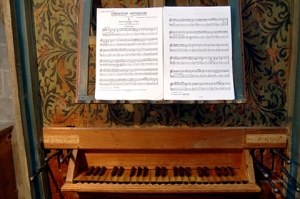Christmas, the Advent season in the church calendar, is a part of the culture. Christmas advertisements seem almost to run year round now. It is the one time when it almost seems acceptable (again) to be a Christian. Between the commercial and cultural pressure on one side and the religious impulse on the other, the press to observe Christmas or the Advent season of the church calendar is great. Yet, there are good reasons why members, elders, and laity ought to think critically about Christmas, advent, and the church calendar generally. Continue reading →
Rule of Worship
The English Congregationalists And Presbyterians Confessed The Rule Of Worship
XVI. That God is to be worshipped according to His own will, and that only in and through Jesus Christ. A New Confession of Faith (1654) in James T. Dennison Jr., ed., Reformed Confessions of the 16th and 17th Centuries in English . . . Continue reading →
The Reformed Rejection Of Alleged “Adiaphora” In Worship In 1578
And in the first place, as relates to the administration or performance of the sacraments, these are observed with Christian and fitting reverence in the churches of this land as they were instituted and ordained by Christ and were used by the . . . Continue reading →
Singing In Acts 16:25 And Plausibility Structures
In the English Standard Version Acts 16:25 says “[a]bout midnight Paul and Silas were praying and singing hymns to God, and the prisoners were listening to them…”. Several other translations (e.g., NASB, NIV, TEV, ASV, RSV, NLT, NKJV, HCSB) follow this or . . . Continue reading →
Olevianus On The Second Commandment And Worshiping The True God
Second it is useful and necessary that in our invocation of God we know what God we are invoking—that true God with whom we have entered into a covenant of faith, who has testified to us in an eternal covenant that He . . . Continue reading →
Why Foot Washing Is Not A Sacrament
Heidelblog reader Randy writes to ask why footwashing (pedilavium) is not regarded as a sacrament. The answer is twofold: 1) from the nature of the sacraments; 2) from the nature and intent of the act of footwashing in the life of our . . . Continue reading →
Help Les Make A Film About Worship
Les Lanphere is the filmmaker who gave us CALVINIST. Les and Tanner host the Reformed Pubcast. He is working on a new film on a most important topic: worship. Continue reading →
Does “Sing To Him A New Song” Justify Praise Songs?
In response to the video of LCMS Pastor Chris Jackson reading the lyrics of a popular praise song one HB reader wrote to object to the implied criticism of the song. The argument is this: Scripture uses the expression “new song” nine . . . Continue reading →
Thomas Cartwright Contra Lent
RHEMI. [ 1. Desert.] As John the Baptist, so our Saviour by going into the desert and there living in contemplation even among brute beasts, and subject to the assaults of the Devil for our sins, gives a warrant and example to . . . Continue reading →
William Whittaker Contra Lent
“But you tell us, why we do so much avoid the Fathers.” I had rather you would tell us why you do so carefully avoid the Scriptures. “For” (say you) “they that cannot away with set times of Fasting, must needs be . . . Continue reading →
Richard Sibbes Contra Lent
Some make a mockery of the holy things of God. One part of the year they will be holy; a rotten, foolish affection of people that are popish. In Lent they will use a little austerity, oh! they will please God wondrously! . . . Continue reading →
Owen Contra Lent, Easter, And The Normative Principle Of Worship
The instances he gives from the church of the Jews, or that may be given, are either civil observances, as the feast of purim; or moral conveniencies directed by general rules, as the building of synagogues; or customary signs suited to the . . . Continue reading →
Christian, Why Do You Sing A Swedenborgian, Social-Gospel, Hymn Written By A Unitarian Minister?
“It Came Upon The Midnight Clear” (now typically titled, “It Came Upon A Midnight Clear”) was first published in 1834. It was written by Edmund Hamilton Sears (1810–76), an Unitarian minister with Swedenborgian convictions. C. Michael Hawn, who teaches sacred music, describes . . . Continue reading →
With Presbycast On Christmas, Pictures, And Ricky Bobby
When it comes to Christmas it gets, as they say, complicated for confessional Presbyterian and Reformed Christians. On the one hand, we heartily affirm the Scriptures and the ecumenical creeds on the incarnation of our Lord. We confess that Mary was the . . . Continue reading →
Ursinus On The Rule Of Worship
It must be commanded by God. No creature has the right, or power to institute the worship of God. But good works (we speak of moral good) and the worship of God are the same. Moral good differs widely from natural good, . . . Continue reading →
William Perkins On The Rule Of Worship And 1 Corinthians 14 Contra Good Intentions
V. Will worship, when God is worshiped with a naked and bare good intention, not warranted by the word of God. (Colossians 2:23) “Which things have indeed a shew o wisdom in will worship, and humility, and neglecting of the body; not . . . Continue reading →
In Defense Of Synod 1574
In the course of research for a couple of purposes (a journal article and a course) I have had opportunity to read the church orders and church laws of the Dutch (Reformed) churches of the 16th and 17th centuries. I have been . . . Continue reading →
1578 Synod Of Dort: Organs To Be Removed ASAP
77. We do not consider the use of organs in the churches to be good especially for the preaching (services). Therefore, we judged that ministers should labor, even though organs are tolerated for a time, that they be removed at the earliest . . . Continue reading →
Synod Of Dort (1578): Psalms Only To Be Sung In Worship
76. The Psalms of David translated by Pieter Datheen shall be sung in the Christian gatherings of the Netherlands churches as has been done until now, excluding the hymns which are not found in the Bible. National Synod of the Netherlands, German, . . . Continue reading →
Resources On Instruments In Worship
Below are gathered the quotations, posts, and essays from the Heidelblog on the history, theology, and practice of instruments in public worship. Continue reading →








